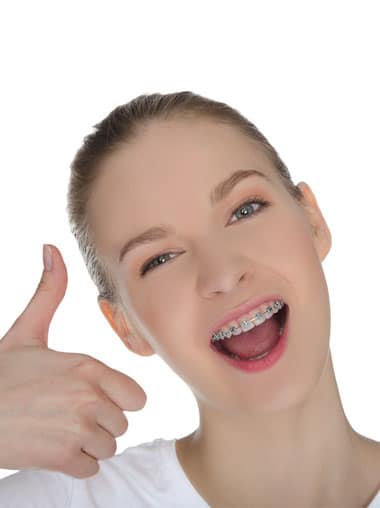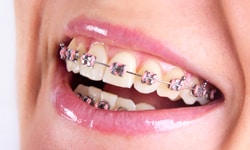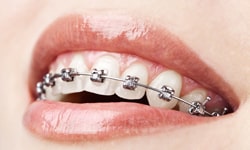Types of Braces
BRACES SIMSBURY, ROCKY HILL, & WALLINGFORD, CT
Transform Your Smile with Zaidi Orthodontics

At Zaidi Orthodontics, we believe everyone deserves a smile they can feel confident about. Braces are a fantastic solution for achieving a healthy, attractive smile, and we’re dedicated to making your orthodontic journey smooth and effective. Located in Simsbury, Rocky Hill, and Wallingford, CT, our practice is committed to providing top-notch orthodontic care tailored to your individual needs.
Our team, led by Dr. Sheeba Zaidi, understands that every smile is unique. That’s why we offer a variety of braces options to ensure the best possible outcomes for each of our patients. Whether you’re dealing with crooked teeth, spacing issues, or bite problems, we have the expertise and technology to help you achieve the results you want. We invite you to learn more about how braces can transform your smile and improve your oral health.

Why Choose Us?
What Are Braces?
Braces are orthodontic devices specifically designed to straighten teeth, correct bite issues, and improve overall oral health. They consist of brackets attached to your teeth, wires that connect these brackets, and sometimes, elastic bands that help move the teeth into their proper positions. These components work together to apply gentle, consistent pressure to your teeth, gradually shifting them into alignment.
At Zaidi Orthodontics, we offer various types of braces to suit different needs and preferences. Each type has its own unique benefits and is chosen based on your specific orthodontic requirements.
Benefits of Braces
Braces do more than just give you a straight smile. Here are some key benefits:
- Improved Aesthetics: A straight, beautiful smile can boost your confidence and self-esteem.
- Better Oral Health: Properly aligned teeth are easier to clean, which helps prevent cavities and gum disease.
- Enhanced Bite Functionality: Braces can correct bite issues, making it easier to chew and speak.
- Prevention of Future Dental Problems: Addressing alignment issues now can help avoid more serious dental problems down the road.

Why Choose Us?

Traditional Metal Braces
Traditional metal braces consist of small metal brackets bonded to the front surface of each tooth and a thin archwire connecting them. This time-tested orthodontic method gently and effectively guides your teeth into their desired positions over time.
With periodic adjustments by our expert orthodontists, traditional metal braces are known for their reliability and durability in treating various orthodontic concerns, making them a popular choice for achieving a beautifully aligned smile.
PROS:
- Highly effective in correcting a wide range of issues
- Consist of durable materials
- Usually the most cost-effective option
- Treatment time is flexible and manageable
CONS:
- Visible on the teeth
- Oral hygiene can be challenging
- May include diet restrictions to avoid damaging the brackets and wires

Ceramic Braces
Ceramic braces, also known as clear or tooth-colored braces, provide a discreet option for achieving a straighter smile. Similar to traditional metal braces, ceramic braces are composed of brackets and wires, but with a key difference—these brackets are made from clear materials that blend with the natural color of your teeth.
PROS:
- Effective in addressing various orthodontic issues
- Discreet appearance with clear brackets that are less visible on your teeth
- Suitable for older teenagers and adults with cosmetic concerns
- Comfortable and less likely to cause mouth abrasions
CONS:
- It may require more attention to oral hygiene due to the larger size of ceramic brackets
- Greater care is needed to avoid staining clear brackets
- Typically used more on upper front teeth than lower teeth to maintain visibility

Self-Ligating Braces
Self-ligating braces represent a modern and efficient approach to orthodontic treatment. These braces use a unique mechanism where the brackets have built-in clips or doors that hold the archwire in place, eliminating the need for traditional elastic bands or ligatures.
Self-ligating braces are an innovative choice for orthodontic treatment, offering efficiency, comfort, and convenience. While they may have a slightly higher cost and limited color options, many patients find their advantages well worth the investment in their smile.
PROS:
- Efficient treatment with self-ligating brackets that require fewer adjustments
- Reduced plaque accumulation compared to traditional brackets and elastics
- Teeth often move more quickly, leading to shorter treatment times
- Longer gaps between treatment visits offer more convenience for patients
CONS:
- Slightly higher cost compared to traditional metal braces
- Limited color options for those seeking a colorful smile
- May not be suitable for all orthodontic cases, especially severe ones

Clear Aligners
Clear aligners represent a popular and discreet orthodontic option for those seeking to achieve a straighter smile without traditional braces. These aligners are a series of clear, removable trays custom-made to fit your teeth and gradually guide them into their desired positions.
Clear aligners offer a nearly invisible and convenient way to straighten your teeth. While they require patient compliance and may not be suitable for all cases, they provide an excellent option for individuals seeking a discreet and comfortable orthodontic treatment experience.
PROS:
- Virtually invisible when worn, providing a discreet orthodontic solution
- Removable, allowing you to eat, drink, and maintain oral hygiene with ease
- Smooth and comfortable, with no metal or wires causing mouth abrasions
- Customized for each patient, ensuring a comfortable fit
- Require fewer and simpler orthodontic appointments
CONS:
- It may require strict compliance with wearing aligners for the recommended duration
- It may not be suitable for all orthodontic cases, especially complex ones
- Aligners can be misplaced or damaged if not properly cared for
Customized Treatment Plans
Braces for Every Age
Braces for Children and Teens
Orthodontic treatment for children and teenagers is essential for guiding proper jaw and tooth development. At Zaidi Orthodontics, we recommend that children have their first orthodontic consultation around the age of 7. Early evaluation allows us to identify any potential issues and determine the best time to start treatment.
For children and teens, braces can address common issues such as:

- Misaligned Teeth: Correcting crooked teeth to improve aesthetics and oral health.
- Overcrowding: Creating space for permanent teeth to emerge correctly.
- Bite Problems: Fixing overbites, underbites, and crossbites to ensure proper bite function.
Early intervention can prevent more severe problems in the future and may reduce the need for more extensive treatment later on. Our expert team is skilled in working with young patients, making the process as comfortable and stress-free as possible.

Braces for Adults
Orthodontic treatment isn’t just for kids and teens. Many adults are now choosing braces to enhance their smiles and improve their oral health. In fact, about 20% of orthodontic patients today are adults. Whether you missed out on braces in your youth or have noticed changes in your smile over time, it’s never too late to benefit from orthodontic treatment.
Adults may choose braces for various reasons, including:
- Aesthetic Improvements: Achieving a straight, beautiful smile that boosts confidence.
- Oral Health Benefits: Aligned teeth are easier to clean, reducing the risk of decay and gum disease.
- Functional Corrections: Addressing issues with bite and alignment to improve chewing and speaking.
- Preventing Future Problems: Correcting alignment now to avoid more complex dental issues later.
We understand that adults have unique concerns when it comes to braces, such as treatment duration, comfort, and appearance. That’s why we offer a range of discreet and efficient options, including ceramic braces and clear aligners, to meet the needs of our adult patients.
Eating with Braces
- Chewy Foods: Bagels, licorice
- Crunchy Foods: Popcorn, chips, ice
- Sticky Foods: Caramel candies, chewing gum
- Hard Foods: Nuts, hard candies
- Foods That Require Biting Into Corn on the cob, apples, carrots
These foods can cause brackets to break or wires to bend, which could extend your treatment time. By avoiding them, you help ensure your braces work as efficiently as possible.
- Dairy: Soft cheese, pudding, milk-based drinks
- Breads: Soft tortillas, pancakes, and muffins without nuts
- Grains: Pasta, soft-cooked rice
- Meats/Poultry: Soft-cooked chicken, meatballs, lunch meats
- Seafood: Tuna, salmon, crab cakes
- Vegetables: Mashed potatoes, steamed spinach, beans
- Fruits: Applesauce, bananas, fruit juice
- Treats: Ice cream without nuts, milkshakes, Jell-O, soft cake
These braces-friendly foods are soft and less likely to damage your appliances. They allow you to enjoy a varied diet while keeping your braces in good shape.
- Cut Food into Small Pieces: This makes it easier to chew and reduces the risk of damaging your braces.
- Chew Slowly and Carefully: Be mindful of how you chew to avoid putting too much pressure on your braces.
- Stay Hydrated: Drinking plenty of water helps keep your mouth clean and can prevent food from getting stuck in your braces.
It's common to experience some discomfort when you first get your braces or after adjustments. Your teeth and mouth may feel tender or sore, but this is completely normal and temporary. Here are some tips to help alleviate the soreness:
- Saltwater Rinse: Dissolve one teaspoon of salt in eight ounces of lukewarm water. Swish this solution in your mouth for a couple of minutes, but do not swallow it. This can help soothe the irritation.
- Pain Relievers: If the soreness persists and is more severe, you can take over-the-counter pain relievers like ibuprofen or acetaminophen to help manage the discomfort.
- Orthodontic Wax: It's not uncommon for your lips, cheeks, and tongue to become irritated for the first week or two as they adjust to the braces. We can provide orthodontic wax to cover the brackets and reduce their tenderness. Please let us know if you need some wax.
Loose Teeth
Feeling like your teeth are a bit loose can be unsettling, but it's a normal part of the process. Your braces need to loosen your teeth slightly to move them into their correct positions. Once your teeth have shifted to their new locations, they will stabilize and no longer feel loose.
Loose Wires and Bands
Sometimes, the wires and bands on your braces may come loose. If this happens, please contact our office as soon as possible so we can repair your appliance. If a piece of your appliance comes off, save it and bring it to your appointment.
Proper care of your orthodontic appliances is crucial to ensuring that your treatment progresses as planned. Damaged appliances can prolong the treatment process, so it's important to follow these guidelines:
Consistent Use of Appliances
Your orthodontic treatment plan may include various appliances like rubber bands, headgear, or retainers. To ensure your teeth and jaw move into their correct positions, it's essential to use these appliances exactly as prescribed by Dr. Zaidi. Inconsistent use can delay your treatment and affect the final results.
- Rubber Bands: Wear them as instructed to help with bite correction.
- Headgear: Follow the specific instructions for how long to wear it each day.
- Retainers: Post-treatment retainers are crucial to maintaining the new position of your teeth.
Handling and Cleaning Your Braces
Taking care of your braces involves regular cleaning and handling them with care to prevent damage.
- Brush your teeth after every meal and floss daily to keep your braces clean and free of food particles.
- Avoid hard and sticky foods that can break or damage your braces. Stick to the recommended foods to avoid complications.
- Attend all scheduled appointments for adjustments and to check on the progress of your treatment.
Playing Sports with Braces
If you’re an athlete, you’ll be glad to know that you can continue to play sports while wearing braces. However, it’s important to take some precautions to protect your teeth and orthodontic appliances.
Wearing a Mouthguard
We highly recommend wearing a mouthguard during any physical activity to protect your teeth and braces from potential injury. Mouthguards provide a cushion that helps prevent damage from impacts to the mouth.
Handling Sports Emergencies
Accidents can happen, and it’s important to know what to do if you experience any issues with your braces while playing sports.
- After any impact on your mouth, check your braces and teeth for any damage.
- If you notice any loose teeth, broken brackets, or bent wires, contact our office right away to schedule a repair appointment.
- In case of discomfort, you can apply orthodontic wax to any sharp areas or rinse your mouth with warm saltwater to soothe irritation.
In the meantime, you can temporarily fix a loose wire by using the back of a spoon or the eraser end of a pencil to gently push the wire back into place. If the loose wire is causing irritation to your lips or cheeks, place a piece of orthodontic wax or a wet cotton ball over the wire to relieve the discomfort.
Additional Tips
- Rinsing with Warm Saltwater: This can help reduce irritation and keep your mouth clean.
- Soft Foods: Stick to soft foods that are easy to chew, especially during the first few days after getting braces or adjustments.
- Good Oral Hygiene: Keeping your teeth and braces clean can help prevent additional discomfort and irritation.
If you experience any issues or have concerns about your braces, don’t hesitate to reach out to our office. We're here to support you throughout your orthodontic treatment and ensure you're as comfortable as possible.
Let's Make Your Dream Smile a Reality!

Get Your Braces Simsbury, Rocky Hill, & Wallingford, CT Treatment at Zaidi OrthodonticsJoin the countless Connecticut residents who have trusted Dr. Sheeba Zaidi and our amazing team to produce stunning smiles. With years of experience, we are dedicated to providing the best orthodontic care and customer service available.
